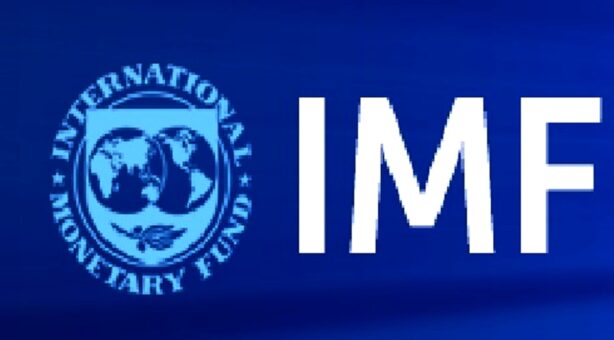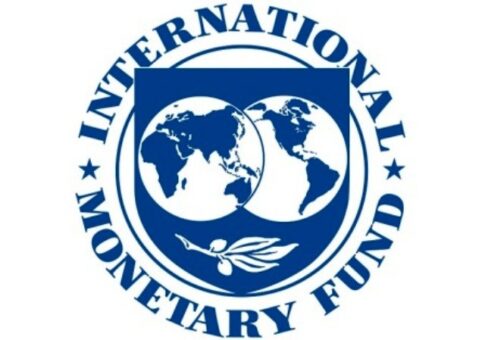Islamabad, June 30, 2023: Prime Minister Shehbaz Sharif announced on Friday that Pakistan has reached a Staff-Level Agreement with the International Monetary Fund (IMF) on a nine-month US$3 billion Stand-By Arrangement (SBA).
(more…)Tag: International Monetary Fund
-

New IMF SBA for Pakistan Exceeds Expectations, Analysts Say
Karachi, June 30, 2023: Pakistan’s new standby arrangement (SBA) with the International Monetary Fund (IMF) has surpassed expectations, according to analysts at Topline Research.
(more…) -

Pakistan Clinches $3 Billion IMF Bailout Package
Islamabad, June 30, 2023: Pakistan has secured a crucial $3 billion bailout package from the International Monetary Fund (IMF) as the country grapples with economic challenges and external shocks.
(more…) -

Finance Minister Ishaq Dar Optimistic about Positive IMF Outcome for Pakistan
Islamabad, June 28, 2023: Minister for Finance, Senator Mohammad Ishaq Dar, expressed optimism regarding the ongoing negotiations between Pakistan and the International Monetary Fund (IMF), stating that positive news would be announced soon.
(more…) -

IMF needs external financing assurances to Pakistan for taking next step
International Monetary Fund (IMF) is needed assurances of external financing to Pakistan as the required huge external financing.
(more…) -

IMF board agrees on need to develop regulations for crypto assets
The executive board of the International Monetary Fund (IMF) agreed on the need to develop and apply comprehensive regulations, including prudential and conduct regulation to crypto assets.
(more…) -

Pakistan reaffirms commitment to complete IMF program
ISLAMABAD: Pakistan on Thursday reaffirmed commitment to complete the loan program under International Monetary Fund (IMF).
The resolve has been expressed at an online meeting of Finance Minister Ishaq Dar with Nathan Porter, IMF Mission Chief for Pakistan.
The two sides discussed the progress made with the ongoing IMF program, particularly the impact of floods on macroeconomic framework and targets for the current year.
IMF indicated its willingness to sympathetically view the targeted assistance for poor and vulnerable, especially flood affectees.
It was agreed that expenditure estimates for flood related humanitarian assistance during the current year will be firmed up alongwith estimates of priority rehabilitation expenditure.
In this regard engagement at the technical level shall be expeditiously concluded for proceeding with the 9th Review. Finance Minister Senator Ishaq Dar reiterated GOP’s commitment to successfully completing the IMF program.
-

IMF board allows $1.1 billion disbursement for Pakistan
Washington, DC: Pakistan will get around $1.1 billion from the International Monetary Fund (IMF) after its executive board on Monday allowed immediate disbursement.
The Executive Board of the International Monetary Fund (IMF) completed today the combined seventh and eighth reviews of the Extended Arrangement under the Extended Fund Facility (EFF) for Pakistan. The Board’s decision allows for an immediate disbursement of SDR 894 million (about $1.1 billion), bringing total purchases for budget support under the arrangement to about $3.9 billion.
READ MORE: Pakistan may face food security due to flash floods
The EFF was approved by the Executive Board on July 3, 2019 for SDR 4,268 million (about $6 billion at the time of approval, or 210 percent of quota). In order to support program implementation and meet the higher financing needs in FY23, as well as catalyze additional financing, the IMF Board approved an extension of the EFF until end-June 2023, rephasing and augmentation of access by SDR 720 million that will bring the total access under the EFF to about $6.5 billion.
Pakistan is at a challenging economic juncture. A difficult external environment combined with procyclical domestic policies fueled domestic demand to unsustainable levels. The resultant economic overheating led to large fiscal and external deficits in FY22, contributed to rising inflation, and eroded reserve buffers. The program seeks to address domestic and external imbalances, and ensure fiscal discipline and debt sustainability while protecting social spending, safeguarding monetary and financial stability, and maintaining a market-determined exchange rate and rebuilding external buffers.
The Executive Board also approved today the authorities’ request for waivers of nonobservance of performance criteria.
READ MORE: SBP issues IBAN list for donations to PM flood relief fund
Following the Executive Board’s discussion on Pakistan, Ms. Antoinette Sayeh, Deputy Managing Director and Acting Chair, issued the following statement:
“Pakistan’s economy has been buffeted by adverse external conditions, due to spillovers from the war in Ukraine, and domestic challenges, including from accommodative policies that resulted in uneven and unbalanced growth. Steadfast implementation of corrective policies and reforms remain essential to regain macroeconomic stability, address imbalances and lay the foundation for inclusive and sustainable growth.
“The authorities’ plan to achieve a small primary surplus in FY2023 is a welcome step to reduce fiscal and external pressures and build confidence. Containing current spending and mobilizing tax revenues are critical to create space for much-needed social protection and strengthen public debt sustainability. Efforts to strengthen the viability of the energy sector and reduce unsustainable losses, including by adhering to the scheduled increases in fuel levies and energy tariffs, are also essential. Further efforts to reduce poverty and protect the most vulnerable by enhancing targeted transfers are important, especially in the current high-inflation environment.
READ MORE: Flash floods affect internet services in Pakistan
“The tightening of monetary conditions through higher policy rates was a necessary step to contain inflation. Going forward, continued tight monetary policy would help to reduce inflation and help address external imbalances. Maintaining proactive and data-driven monetary policy would support these objectives. At the same time, close oversight of the banking system and decisive action to address undercapitalized financial institutions would help to support financial stability. Preserving a market-determined exchange rate remains crucial to absorb external shocks, maintain competitiveness, and rebuild international reserves.
“Accelerating structural reforms to strengthen governance, including of state-owned enterprises, and improve the business environment would support sustainable growth. Reforms that create a fair-and-level playing field for business, investment, and trade necessary for job creation and the development of a strong private sector are essential.”
-

Rupee fall to continue till IMF fund realization: Pakistan’s top bank
KARACHI: Pakistani Rupee likely to continue its falling spree until the country receives funds from the International Monetary Fund (IMF), according to an analyst briefing by the Habib Bank of Pakistan (HBL), the top bank of the country.
“The bank management believes that the rupee would continue to depreciate until Pakistan receives $1.2 billion from IMF,” according to the Topline Securities quoting the bank.
READ MORE: HBL ordered to compensate bank fraud victim
The HBL conducted its second quarter of 2022 analyst briefing on July 29, 2022 where the management discussed financial results of the bank and its future outlook.
The asset repricing of the loan book is likely to re-price by 3Q2022 and 4Q2022. As a result, Net Interest Income (NII) and Net Interest Margins (NIMs) of the bank are likely to remain strong in 2H2022 as per the management. The management expects further hike in policy rate in the upcoming monetary policy meeting.
READ MORE: SBP takes measures for prevention of digital bank fraud
On loan growth the management indicates that HBL will continue to grow and remain in double digit. Deposits are also expected to grow in an ongoing year where HBL is targeting to maintain its market share of 14 per cent.
Foreign exchange income jumped to Rs7.8 billion in the first half of 2022 vs Rs1.4 billion 1H2021 primarily due to (1) Rs1.3 billion from the revaluation of overseas banking due to rupee devaluation, (2) Rs3.2 billion generated from the long derivative FX position, and (3) Rs1.9 billion treasury activities.
The bank offered Voluntary Separation Scheme (VSS) to its employees amounting to Rs2.6 billion in 1Q2022 and Rs0.6 billion in 2Q2022.
READ MORE: SBP directs banks to report digital fraud cases
Out of the total PIB portfolio, around 55 per cent of PIBs are floater rates with average yield of around 11 per cent and T-bill yields of 10.75 per cent. Fixed PIB worth of Rs50 billion is maturing in July however no other PIBs are maturing in 2H2022.
HBL continues to focus on improving its customer experience in the digital space which is also evident from its improving numbers. Total mobile app monthly active users reached 1.8 million in 1H2022 vs. 1.3 million in 1H2021.
READ MORE: Habib Bank, Meezan Bank directed to pay fraud victims
The management highlighted that in the current economic scenario, stress is seen in Autos, Cement, Steel and few other customers but with current provisions HBL is at a comfortable levels. Total coverage of the bank now stands at 101 per cent in June 2022 vs. 100 per cent in March 2022.
Bank’s cost to income ratio in 1H2022 stood at 52.1 per cent vs. 51.3 per cent in 1H2021. Management targets to maintain the current cost to income ratio where the growth in operating expenses are in line with the inflation.
HBL posted strong financial results, but due to higher taxation which hits bottom-line resulting into ROE of 9.2 per cent and ROA of 0.5 per cent.
READ MORE: President Alvi rejects MCB Bank’s appeal in fraud case
-

SBP’s monetary policy tightening appropriate: IMF
ISLAMABAD: The International Monetary Fund (IMF) has supported the monetary tightening by the State Bank of Pakistan (SBP) saying that it was necessary to bring down inflation.
The IMF in a statement related to Staff Level Agreement (SLA) with Pakistan authorities, issued on Thursday said that Pakistan’s headline inflation exceeded 20 percent in June, hurting particularly the most vulnerable.
READ MORE: IMF demands Pakistan to remove fuel, energy subsidies
“In this regard, the recent monetary policy increase was necessary and appropriate, and monetary policy will need to be geared towards ensuring that inflation is brought steadily down to the medium-term objective of 5–7 percent.”
The SBP on July 07, 2022 raised the key policy rate by 125 basis points to bring it at 15 per cent. The central bank increased the policy rate from 7 per cent in September 2021 to 15 per cent by July 07, 2022.
Importantly, to enhance monetary policy transmission, the rates of the two major refinancing schemes EFS and LTFF (which have over recent months been raised by 700 basis points and 500 basis points respectively) will continue to be linked to the policy rate. “Greater exchange rate flexibility will help cushion activity and rebuild reserves to more prudent levels,” it added.
READ MORE: Foreign investment falls by 57% in 10MFY22: SBP
IMF staff and the Pakistani authorities have reached a staff level agreement on policies to complete the combined 7th and 8th reviews of Pakistan’s Extended Fund Facility (EFF). The agreement is subject to approval by the IMF’s Executive Board.
High international prices, and a delayed policy action worsened Pakistan’s fiscal and external positions in FY22, led to significant exchange rate depreciation, and eroded foreign reserves.
The immediate priority is to stabilize the economy through the steadfast implementation of the recently approved budget for FY23, continued adherence to a market-determined exchange rate, and a proactive and prudent monetary policy. It is important to expand social safety to protect the most vulnerable, and accelerate structural reforms including to improve the performance of state-owned enterprises (SOEs) and governance.
READ MORE: Current account deficit swells to $13.78 bn in 10 months
The IMF team has reached a staff-level agreement (SLA) with the Pakistan authorities for the conclusion of the combined seventh and eight reviews of the EFF-supported program.
The agreement is subject to approval by the IMF’s Executive Board. Subject to Board approval, about $1,177 million (SDR 894 million) will become available, bringing total disbursements under the program to about $4.2 billion. Additionally, in order to support program implementation and meet the higher financing needs in FY23, as well as catalyze additional financing, the IMF Board will consider an extension of the EFF until end-June 2023 and an augmentation of access by SDR 720 million that will bring the total access under the EFF to about US$7 billion.
READ MORE: Import ban not to apply on L/C issued before May 19, 2022
Following are the key points of IMF statement:
“Pakistan is at a challenging economic juncture. A difficult external environment combined with procyclical domestic policies fueled domestic demand to unsustainable levels. The resultant economic overheating led to large fiscal and external deficits in FY22, contributed to rising inflation, and eroded reserve buffers.
“To stabilize the economy and bring policy actions in line with the IMF-supported program, while protecting the vulnerable, policy priorities include:
Steadfast implementation of the FY2023 budget. The budget aims to reduce the government’s large borrowing needs by targeting an underlying primary surplus of 0.4 percent of GDP, underpinned by current spending restraint and broad revenue mobilization efforts focused particularly on higher income taxpayers. Development spending will be protected, and fiscal space will be created for expanding social support schemes. The provinces have agreed to support the federal government’s efforts to reach the fiscal targets, and Memoranda of Understanding have been signed by each provincial government to this effect.
Catch-up in power sector reforms. On the back of weak implementation of the previously agreed plan, the power sector circular debt (CD) flow is expected to grow significantly to about PRs 850 billion in FY22, overshooting program targets, threatening the power sector’s viability, and leading to frequent power outages. The authorities are committed to resuming reforms including, critically, the timely adjustment of power tariff including for the delayed annual rebasing and quarterly adjustments, to improve the situation in the power sector and limit load shedding.
Reducing poverty and strengthen social safety. During FY22, the unconditional cash transfer (UCT) Kafalat scheme reached nearly 8 million households, with a permanent increase in the stipend to PRs 14,000 per family, while a one-off cash transfer of PRs 2,000 (Sasta Fuel Sasta Diesel, SFSD) was granted to about 8.6 million families to alleviate the impact of rampant inflation. For FY23, the authorities have allocated PRs 364 billion to BISP (up from PRs 250 in FY22) to be able to bring 9 million families into the BISP safety net, and further extend the SFSD scheme to additional non-BISP, lower-middle class beneficiaries.
Strengthen governance. To improve governance and mitigate corruption, the authorities are establishing a robust electronic asset declaration system and plan to undertake a comprehensive review of the anticorruption institutions (including the National Accountability Bureau) to enhance their effectiveness in investigating and prosecuting corruption cases.
“Steadfast implementation of the outlined policies, underpinning the SLA for the combined seventh and eighth reviews, will help create the conditions for sustainable and more inclusive growth. The authorities should nonetheless stand ready to take any additional measures necessary to meet program objectives, given the elevated uncertainty in the global economy and financial markets.
“The IMF team thanks the Pakistani authorities, private sector, and development partners for fruitful discussions and cooperation during the discussions.”
